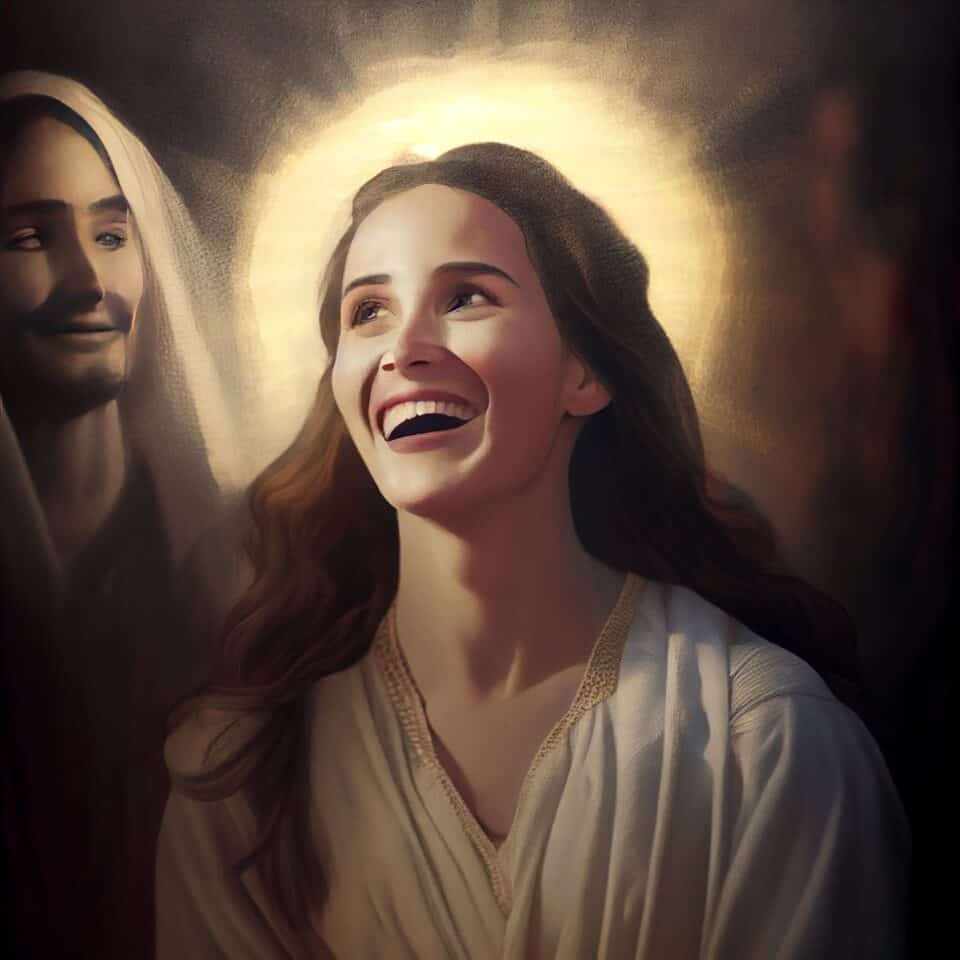I have always believed in the existence of God. To me, believing in God is more than just a religious belief. It is instead an understanding of the universe and my place in it. While everyone’s path is different, my belief in God gives me a sense of security and connection to something bigger. It provides me with purpose in my life, something to strive for, and helps me see the world’s beauty and goodness.
In this article, I will explain why I believe in God.
Definition of God
The definition of God is an all-powerful, all-knowing spiritual being who is the creator of everything that exists. He is often called the Supreme Being, although some prefer using terms such as Divine Creator or Maker.
God is commonly seen as a loving and compassionate figure who has created a beautiful world with humanity in mind. He is believed to have a plan and purpose for each individual and all of creation, which can be seen through His many works throughout history.
People can experience God in their everyday lives through prayer and meditation, and many believe He reveals Himself through miracles and answered prayer. God also speaks to believers through His word – the Bible – providing life guidance and teaching us how to live according to His will.
In addition, many religions hold that God has a special relationship with His chosen people – those who have faith in Him – providing friendship, protection, comfort, forgiveness, healing, strength during difficult times, direction for life decisions, and eternal life after death.
Arguments for the Existence of God

The belief in the existence of God is not only held by numerous individuals worldwide but is also a core part of many religions. One must look at various arguments for His existence to understand God and why people believe in Him.
In this article, we will explore different arguments for the existence of God and why I personally believe in Him:
The Cosmological Argument
The cosmological argument is a philosophical effort to prove the existence of God, one of the most widely accepted among theologians since ancient times. In its simplest form, it states that all things have a cause; therefore, an uncaused being must exist to create the universe.
The cosmological argument relies on several key assumptions:
- Everything that exists has a cause;
- The universe seems to have had a beginning in time;
- An actual infinite series of causes for the universe cannot exist; and
- Therefore, an uncaused being, which we call God, must exist as the ultimate cause of our universe.
This argument is based on the concept of causality – that every effect must have a cause – and there is nothing in nature that could be its own cause or an end in itself. Therefore something must be outside of nature– an uncaused being– which has always existed as the ultimate source from which all else comes into existence. This idea can be seen in many religions, such as Hinduism and Christianity, which often refer to God as “the Eternal One.” It also follows from another basic assumption–the Principle of Sufficient Reason –which states that everything has a purpose or reason behind its existence rather than not existing at all.
Ultimately, proponents of cosmological argument make their case by arguing that without an uncaused being (God), our experience cannot make sense – things happen without any meaningful explanation or understanding – and yet something clearly brought this entire process into motion at some point in time (the “Big Bang“). Thus they conclude – since God is outside time and not dependent on anything else – this uncaused being must exist for us to make sense of what we experience around us today and how it all came about.
The Teleological Argument
The teleological argument, also known as the Argument from Design, is an argument for the existence of God that claims that the presence of purpose and order in nature is evidence for the existence of a divine being. In its simplest form, it states that since everything in nature appears to act with a purpose, a designer must be responsible for it.
Proponents of this argument include Plato and St. Thomas Aquinas, and William Paley. The argument can be summed up in three main points:
- The universe exhibits feature consistent with design;
- All designed objects have designers;
- Therefore, the universe must have had a designer – God.
The teleological argument explains that if one examines any natural phenomenon closely enough, one will likely observe evidence of Order or Design because everything in nature follows a complex order of cause and effect, which requires planning on some level or another. For example, one could look at the intricate patterns found across many species within ecosystems or even those incredibly complex organs within our bodies, such as the brain or heart, and claim that since these all exhibit some form of complexity that suggests design, then there must have been a designer – much like how when you look at an intricately crafted watch you assume someone made it. This Designer could only be God to many who use this train of thought to justify their belief in His existence.
The Ontological Argument
The Ontological Argument is a philosophical argument for the existence of God proposed by archbishop Anselm of Canterbury in the 11th century. His claim was that since God is defined as a being “so perfect that none greater can be thought of,” then it is impossible for such a being not to exist, as existing would be greater than merely existing in one’s imagination.
This argument has been continuously discussed, challenged, and defended throughout the centuries. Versions of this argument have been proposed by philosophers from René Descartes to Alvin Plantinga, allowing for different interpretations and applications. While criticized for its reliance on unprovable premises and potential for circular reasoning, advocates argue that it provides evidence that disproves atheism and shows people why they should believe in God.
The Ontological Argument postulates that the highest conceivable being must be seen as necessarily existing because its non-existence would be contradictory. This leads to conclusions such as if God exists in one’s mind, he must also exist outside of it since the thought of an incomparably perfect being implies his actuality rather than just imagination. This idea stands somewhat separate from other types of proof related to morality, emotions, or experience since it relies more on philosophical reasoning rather than empirical data.
It’s an abstract concept with real-world implications; that some see as providing further insight into why individuals should accept or reject religious belief systems in favor of better understanding their own beliefs about divinity and creation:
- The highest conceivable being must be seen as necessarily existing because its non-existence would be contradictory.
- If God exists in one’s mind, he must also exist outside of it.
- The Ontological Argument relies more on philosophical reasoning rather than empirical data.
- It further explains why individuals should accept or reject religious belief systems.
Personal Experiences
I grew up in a Christian home surrounded by family and church members who believed in God. As I got older, I started to read the Bible and attend church more regularly, and I began to feel God’s presence in my life. From the people I surrounded myself with to the miracles I witnessed and the struggles I encountered, I realized that God was real and had power over my life.
Personal Experiences of Miracles
My personal experiences are what have led me to believe in God. Time and time again, I have felt His presence in my life and experienced miracles that I cannot explain. Whether it is an unexpected blessing bestowed upon me or an answer to prayer, I have experienced moments that I could not deny were a result of a Higher Power.
I have seen and experienced the power of prayer as it has been miraculously answered in small and great matters. On multiple occasions, dramatic problems I’ve been facing have been solved with perfect timing that could only be credited to Divine intervention. Instances like this one make me feel even more thankful for my faith.
I cannot deny the powerful momentum of answered prayers, divine interventions, miraculous healings, and unexplainable blessings has had on my spirit. These events continue reinforcing my belief in God through powerful evidence of His divine love and grace. Undoubtedly, these amazing feet of kindness could only come from a grander power beyond what we can understand or imagine here on Earth.
Personal Experiences of Answered Prayer
I have been blessed with many personal experiences of answered prayer throughout my life. From big moments like healing from debilitating illness to small moments like finding a parking spot in an unfamiliar city, I have seen God’s gracious help throughout my life. As a Christian, these experiences of answered prayer affirm my faith and remind me of God’s presence and His desire to be involved in all aspects of our lives.
There were times when the answer to prayer was glaringly obvious, but I still felt God’s peaceful assurance and love even when the answer couldn’t be seen with the natural eye. For me, it’s not about getting what I want; it’s about having a relationship with the One who will never fail or forsake me. Answered prayers prove that God loves us and wants what is best for us, even if we don’t always get the outcome we expect or desire.
I am grateful for each experience of answered prayer because each one strengthens my faith and deepens my relationship with God. Even when things don’t turn out as planned or prayed for, I can trust that He hears me and is working all things together for good (Romans 8:28). Answered prayers build within us an unwavering faith in a good and loving Father who desires to hear our requests and show His power on our behalf even when it doesn’t make sense in light of our circumstances.
The Bible
The Bible has been an integral part of my belief in God. While many people have differing views on the Bible, it offers me peace and comfort that I can’t get elsewhere. The Bible speaks of a loving God who desires to have a relationship with us, which is what I believe in and strive to do.
This article will discuss why I believe in the Bible and how it strengthens my faith.
The Historical Accuracy of the Bible
The Bible has withstood the test of time and has been proven to be historically accurate. Numerous archaeological discoveries have verified the Bible’s historical accuracy. The reliability of biblical accounts has held up to many scientific scrutiny and archaeological discoveries.
In terms of its textual authenticity, the Bible stands alone. No other ancient document comes close to the sheer number of manuscripts, the accuracy of preservation, and the completeness of original text compared to the Bible. It is often debated whether or not certain portions of books are historically accurate; however, in general, there is much evidence for various accounts throughout the Old Testament and New Testament.
In addition to ancient manuscripts and archaeological findings, many scholars agree that there is an artistic unity within the Bible’s text that would suggest a Divine Author- even those who are secularists. The authorship touches on many philosophical issues yet illuminates how these authors applied were incredibly observant when observing their contemporaries. They were also incredibly deft with details when recording these observations into their writings- both factors suggesting an omniscient author outside of man’s frame of reference was at work in some form or fashion (Romans 3:2).
Finally, it is important to point out that this evidence has been presented internally and externally, providing a case for its veracity which strengthens faith rather than causing doubt (John 20:30-31; II Peter 1:20-21). And while no single point is conclusive on its own, taken together, it becomes increasingly unsurprising how each provides more insight into interpreting scripture.
The Impact of the Bible

Many people turn to the Bible when looking for a reason to believe in a higher power. Although the Bible does not provide scientific proof of God’s existence, its impact throughout history cannot be denied.
The Bible is the most widely read book of all time, transcending cultures and ages. The ancient text is revered as a source of knowledge and spirituality in numerous faith traditions, spanning cultures around the world. It answers questions posed through centuries – about morality, values, and purpose – and provides significant guidance on how humanity should live together as communities and individuals.
Its stories draw us closer to God by revealing His infinite love for us and His unwavering support in any adversity we face. From Creation to the Cross, Scripture inspires believers while exposing their need for a Savior and comforting them with promises of eternal life in God’s presence. The Bible has also served as an instrument in providing solace during times of sorrow or tragedy throughout history and hopes for a bright future free from suffering or injustice after death.
Moreover, its impact on communities is even more obvious;
- countless churches have been established based upon Biblical themes or scriptures;
- countless sects have formed from different interpretations;
- countless movements have been organized against various injustices inspired by its guiding words; and
- countless men and women have devoted their lives to spreading the Good News within these pages!
It continues to carry this message, often leading individuals to repent personally and corporately worldwide, inspiring a thought-provoking lifestyle that honors their Creator, our Lord Jesus Christ!
Conclusion
In conclusion, I believe in God because of the evidence that exists. The Bible contains stories and accounts of miraculous events that demand examination and consideration by anyone who wants to understand the truth. There are scientific theories, personal experiences, and philosophical arguments in favor of a Supreme Being. And despite advances in science and technology that may cause us to question the existence of a higher power, the fact remains that many people are still finding strength and purpose through believing in a Creator.
It’s an ongoing journey for many of us, but my faith has been strengthened because I know there is something more than what meets the eye in this world.
